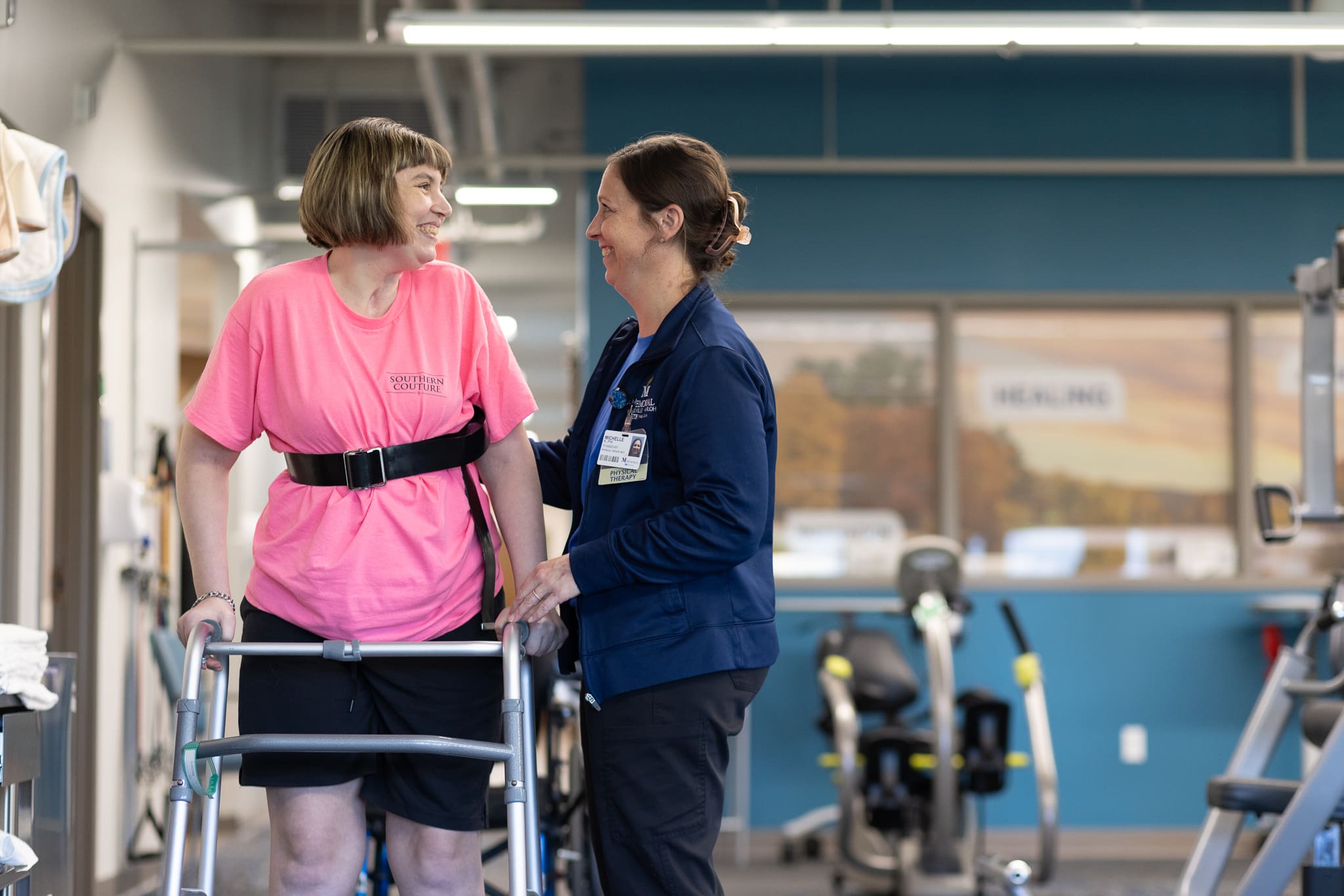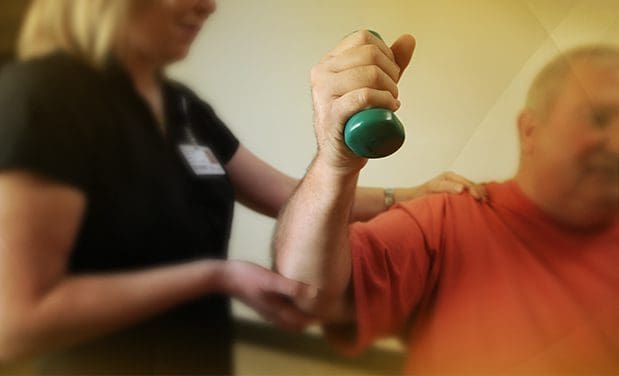Making Strides: How Rehab Therapy Helped One Woman Rebuild Her Strength After a Rare and Life-Changing Illness
When Kelly Jackson first went to the rehabilitation center at Memorial Hospital in Shiloh, in 2022, she could barely move any of her limbs—and it was unclear to Jackson, her family and her health care providers whether she ever would again.

Jackson’s long journey began when she started feeling sick in early 2021. Two weeks into her illness, her parents found her on the floor of their house, unconscious.
Jackson, an athlete who competed in the Special Olympics in volleyball, basketball and track, has epilepsy. Her parents assumed she had experienced a seizure and took her to a hospital for evaluation. It was there that she was diagnosed with Guillain-Barre syndrome (GBS), a rare disorder in which the body’s immune system attacks and damages the peripheral nerves. GBS can be mild, but in some cases can lead to paralysis and, rarely, even death. Jackson deteriorated frighteningly quickly, losing most of her strength and mobility. She spent 10 weeks in the ICU and a total of seven months hospitalized with a ventilator and feeding tube.
“She could barely move,” said Brenda Jackson, Jackson’s mother. “She lost 80 pounds from the start of her journey. We almost lost her.”
Fatigue and Frustration
Slowly, Jackson began to improve, and she entered rehab at Memorial Hospital at Shiloh in April 2022. Her recovery goals were initially modest; her physical therapists Michelle Kalmer and Kurt Gajewski were focused on just improving her overall strength, with hopes she could possibly transfer from her bed to a wheelchair unassisted. “There are varying degrees of mobility after GBS,” Gajewski said. “Some are wheelchair bound, some are in better shape. In Kelly’s case, it was pretty severe, with arms, legs and hand weakness. She was pretty affected throughout her whole body.”
Physical therapy had its ups and downs. Jackson did well with mat and general strengthening exercises and reached her goal of being able to transfer from a bed to her wheelchair unassisted. Some days, Kalmer said, Jackson was thrilled to be there; others, she was fatigued and frustrated. Her case was complicated by her epilepsy medications and special needs. After initial improvement, Jackson’s progress plateaued when they tried to move her to the parallel bars. Parallel bars provide support for patients who have difficulty standing or walking on their own, but Jackson was unable to advance.
A Turning Point
After a brief stint at another BJC rehab center, Jackson returned to Shiloh in April 2023. It was then, her therapists say, that she reached a turning point. She began to improve rapidly on the parallel bars.
“When she came back, I don’t know if she had a different mindset, but she started advancing a lot more,” Kalmer said.” She’s not a quitter; she’ll do anything you ask her to do, and if she’s afraid, she’ll tell you.”
Jackson also works with occupational therapist Rosanna Harmon to improve her hand and upper body strength and regain motor skills. “Kelly has amazing determination to accomplish her goals. We all celebrate with her when she achieves a new skill and regains more independence.”
During one appointment, almost on a whim, Kalmer asked Jackson if she wanted to try walking using a walker. After being fitted with a gait belt to steady her, she haltingly began to walk assisted by only the walker to keep her upright. Jackson’s transformation, Kalmer said, was instantaneous.
“Her attitude changed a lot,” she said. “Not that she had a bad attitude before, but she changed. She got really excited. She really wanted to walk, to have that independence.”
Exceeding Expectations
Jackson’s mother Brenda said it was a triumphant moment for her and her daughter.
For Jackson, being on her feet was a sign that the team at Shiloh could help her get back to her normal life, after so many months of change. Her enormous gains have helped her look toward the future.
Jackson won gold in bowling at the most recent local Special Olympics competition, participating from her wheelchair; if she wins gold at her next competition, she’ll qualify for the state Special Olympics in Peoria, IL. After recovering from hand surgery to regain motor skills, Jackson was cleared to continue outpatient rehab in Shiloh in hopes to exceed more goals. Her goal is to be able to drive again.
“I don’t know where we’d be without the team here,” Brenda said. “We can’t say enough about all the therapists. We just hope this story encourages people to keep fighting to reach their goals, because we see that more and more each day.”
Gajewski said that it was Jackson’s inner strength and motivation that was one of the keys to her ongoing success.


